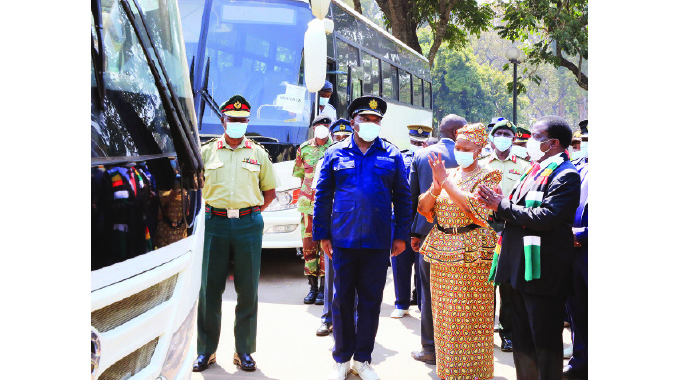NDS1 delivering 3 000 schools

Fungi Kwaramba Political Editor
AS part of implementing Vision 2030 anchored on the National Development Strategy 1 (NDS1), the Government has started the construction of 3 000 schools around the country with President Mnangagwa expressing satisfaction at the pace infrastructure development is taking place in the country.
Over the past few months, the Second Republic has implemented infrastructural projects such as road rehabilitation and dam construction as part of the journey towards fulfilling Vision 2030. Public transportation continues to be improved as the Government continues to acquire more buses with three batches expected to arrive in October, November and December.
A highly successful agricultural season that was made possible through investment in the critical sector means that for the first time in many years Zimbabwe is self-sufficient — itself a goal that President Mnangagwa said the Second Republic is committed to fulfil.
In an interview after handing over five buses to the country’s security sector at State House in Harare yesterday, the President said his Government will continue funding similar initiatives to improve the livelihoods of its employees and the general public.
Asked if he is satisfied with the pace that Vision 2030 is shaping up, the President said there is notable progress in the agriculture and infrastructure development sectors.
“At least we have a vision and its unfolding and the public is able to see what we are doing. We are implementing this vision at the pace at which we are able to finance. If our financial muscle strengthens, the pace at which we implement our vision will be more rapid, but currently, we are implementing what we have said in terms of infrastructure development in the country.
“We know that it is necessary that we address the question of food security in this country, the agricultural sector, that is why we have a programme on mechanisation and modernisation of our agriculture as well as creating enough water bodies for the purposes of irrigation, to put under irrigation a certain number of hectares that guarantees food security whether there is drought or no drought.
“Secondly, as that grows it is necessary that we facilitate the movement of trade and this is why we are also focusing on road construction, bridge construction, this is to connect ourselves with the rest of the region. We are almost a hub, if we do not have good roads countries will avoid passing through Zimbabwe but if we have good roads that are regionally acceptable then Zimbabwe becomes a transport hub for the region,” the President said.
Presently, there is massive road rehabilitation under the Emergency Road Rehabilitation Programme phase 2which had seen most roads impassable or difficult to navigate owing to incessant rains and decades-long neglect.
Government mobilised $400 million for the rehabilitation of the country’s major highways, urban and rural roads and some feeder roads.
Other infrastructure developments the Second Republic has been carrying out include expansion of major airports that include the Robert Gabriel Mugabe International Airport, construction of one-stop court in Chinhoyi and construction of low-cost houses and flats.
“Beyond that, we also are looking at making sure that the education sector is attended to and we have an exercise where the Minister of Education Cde Cain Mathema has submitted 3 000 schools which require to be built countrywide.
“So there is no area in Zimbabwe that will remain behind in terms of access to education and we have begun funding that programme,” said President Mnangagwa.
Under the NDS1, the Government will be paying particular attention to broadening access and participation to education by marginalised populations in both rural and urban areas with the private sector expected to play a key role as envisaged by the strategic economic blueprint.
The President handed two buses to the Zimbabwe National Army (ZNA), with one going to the Presidential Guard while the other one to the Zimbabwe National Army Headquarters. The Air Force of Zimbabwe, the Zimbabwe Republic Police (ZRP) and the Zimbabwe Prisons and Correctional Services (ZPCS) received a bus each during the handover ceremony.
Addressing the service chiefs, the President said more buses for both the public and security sector are on their way.
“This is to facilitate the defence sector, slowly but we are moving on. Some buses are on the high seas. We should be able to have another batch in October, another batch in November, and another batch in December. So each one is assured of another three by December. That should improve your situation. I asked the CDF to work out the basic minimum requirements for each division,” the President said.
Defence and War Veterans Minister Oppah Muchinguri-Kashiri, Local Government and Public Works Minister July Moyo, Zimbabwe Defence Forces Commander General Philip Valerio Sibanda, Air Force Commander Air Marshal Elson Moyo, ZRP Commissioner-General Godwin Matanga, and ZPCS Commissioner-General Moses Chihobvu attended the handover ceremony.











Comments